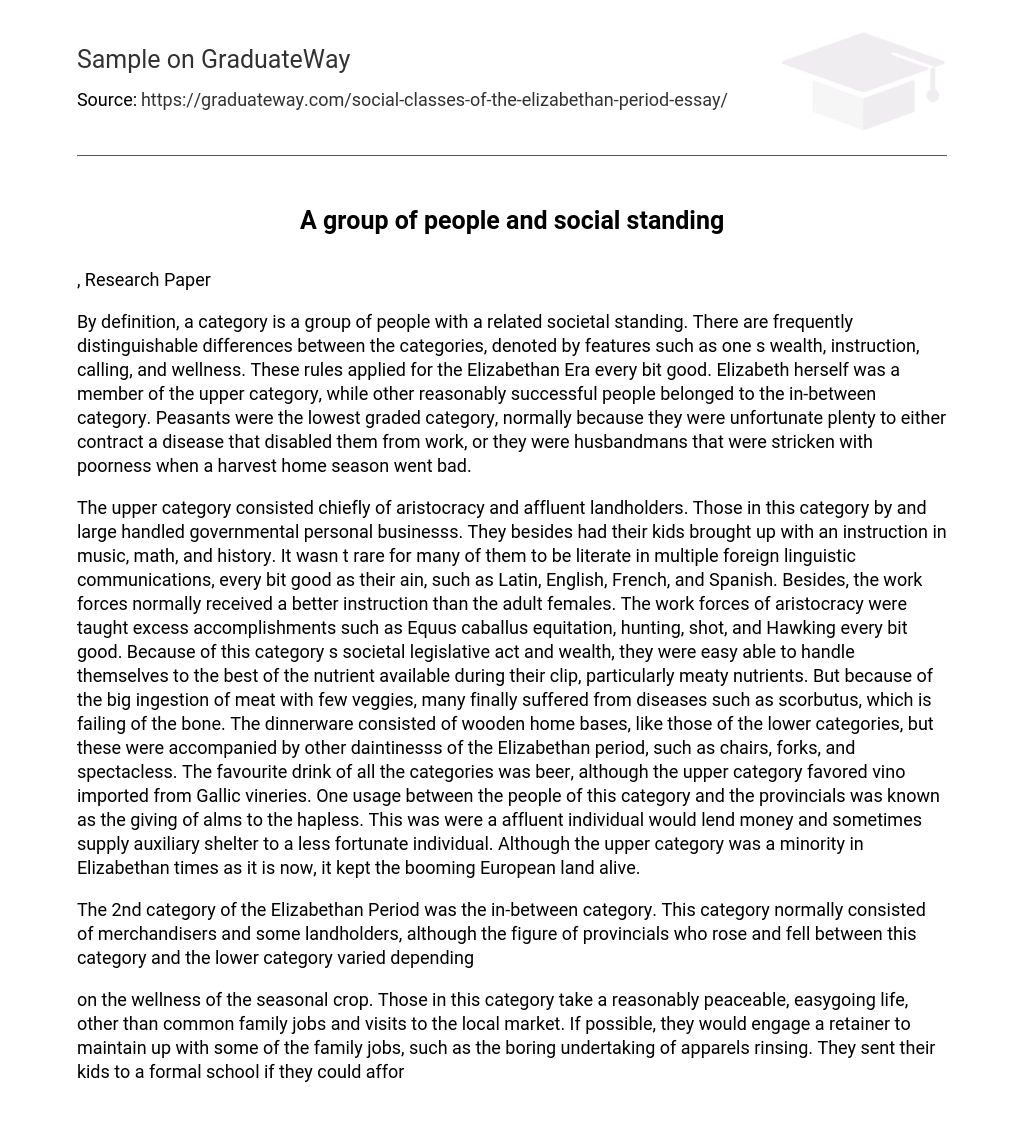By definition, a category is a group of people with a related societal standing. There are frequently distinguishable differences between the categories, denoted by features such as one s wealth, instruction, calling, and wellness. These rules applied for the Elizabethan Era every bit good. Elizabeth herself was a member of the upper category, while other reasonably successful people belonged to the in-between category. Peasants were the lowest graded category, normally because they were unfortunate plenty to either contract a disease that disabled them from work, or they were husbandmen that were stricken with poorness when a harvest home season went bad.
The upper category consisted chiefly of aristocracy and affluent landholders. Those in this category by and large handled governmental personal business. They besides had their kids brought up with instruction in music, math, and history. It wasn’t rare for many of them to be literate in multiple foreign linguistic communications, every bit good as their ain, such as Latin, English, French, and Spanish. Besides, the workforces normally received better instruction than the adult females. The workforces of the aristocracy were taught excess accomplishments such as Equus caballus equitation, hunting, shot, and Hawking every bit good. Because of this category s societal legislative act and wealth, they were easily able to handle themselves to the best of the nutrient available during their clip, particularly meaty nutrients. But because of the big ingestion of meat with few veggies, many finally suffered from diseases such as scorbutus, which is failure of the bone.
The dinnerware consisted of wooden home bases, like those of the lower categories, but these were accompanied by other daintiness of the Elizabethan period, such as chairs, forks, and spectacles. The favourite drink of all the categories was beer, although the upper category favoured vino imported from Gallic vineries. One usage between the people of this category and the provincials was known as the giving of alms to the hapless. This was were an affluent individual would lend money and sometimes supply auxiliary shelter to a less fortunate individual. Although the upper category was a minority in Elizabethan times as it is now, it kept the booming European land alive.
The 2nd category of the Elizabethan Period was the in-between category. This category normally consisted of merchandisers and some landholders, although the figure of provincials who rose and fell between this category and the lower category varied depending
on the wellness of the seasonal crop. Those in this category take a reasonably peaceable, easygoing life, other than common family jobs and visits to the local market. If possible, they would engage a retainer to maintain up with some of the family jobs, such as the boring undertaking of apparels rinsing. They sent their kids to a formal school if they could afford it. The parents were so captive for their kids to larn the stuff that they encouraged instructors to crush them if they made errors or became lazy. The in-between category frequently could non afford some of the things taken for granted by the upper category, such as chairs alternatively of stools, forks, spectacless, and a big choice of meats. The in-between category drove the economic system of Britain through its trades with other European states.
The provincials made up the lower category. These people were either sick, lazy, became labourers, or were merely turned a bad manus during the harvest season. The labourers and retainers served long hours each twenty-four hours managing the least favourable occupations, such as field work and wash. During bad seasons, every bit many as 25 % could non afford nutrient, and frequently the most they of all time ate was bread. In many instances they turned to thievery, otherwise they would hunger. Some were lucky plenty to have alms from the wealthy, but many didn T, because of their great figure.
The upper category pitied the provincials that were ill or that couldn’t discover work, so they created a system to care for them. If there were able workforces that were merely lazy and instead beg on the streets, a Parish, or the individual in charge of the system locally, would direct them to a larger metropolis where they would be whipped and so sent back and assigned an occupation. If an adult male was badly, they would frequently seek to take him in and give him plenty nutrients to last on. Widows and their households were besides treated in the same mode. In the terminal, when crop was good, every category benefited, and it created particularly good seasons for the hapless, otherwise, it was the provincials who suffered most.
The categories of the Elizabethan Period established a society that became a theoretical account for many contemporary civilizations. Though non-perfect, it still exists today, even in America to some grade. The upper category was the wealthiest and had the most power, while the in-between category was largely involved in trade, and the lower category made up the balance who were frequently sick or widowed.





